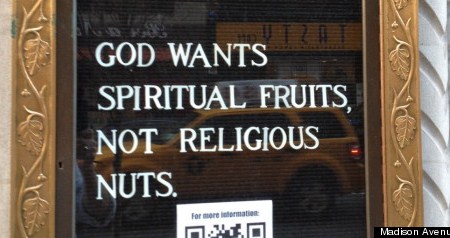By Jeff Brumley
“Blessed are the flexible, for they shall not be bent out of shape.”
Thus read the sign recently in front of Madison Avenue Baptist Church, a New York City congregation whose pastor is all about convincing folks not to take themselves so seriously all the time.
“My whole ministry is about putting a different face on the church and the gospel – joy and hope, not judgment and shame – and this plays into that,” said Susan Sparks, who’s also an accomplished stand-up comic.

And the sign out front is a big part of it. “This is inviting people to smile,” she said.
Sparks’ church is by no means the only one in America that posts thought-provoking, laugh-inducing messages on its sign. But it has been getting the lion’s share of publicity for its messages since at least the dawning of the social media age.
The American Baptist church and another of its recent messages – “God wants spiritual fruits, not religious nuts” — were featured in a recent Huffington Post article and have been the subject of New York-based media newspapers and web sites.
Sparks guessed that a younger generation and others with cell phones and instant access to Facebook and Twitter, where photos of the sign appear regularly, may have sparked some of the interest in local media.
But it may also be simply sticking to some of the principles of good church signs, said David Claassen, a Congregational Church pastor in Ohio who authored Silent Words Loudly Spoken, a 2005 book about church signs.

He advises against messages meant for internal use only (like “leadership retreat this weekend”) keeping messages posted more than a week.
Another practice to avoid is simply posting announcements of worship times or trying to cram too many words on a sign. Claassen said that makes it harder for motorists to read as they drive past.
“Especially in this age of Twitter, brevity is beautiful,” he said. “Church signs are a tweet for everybody.”
But most of all keep it positive, he added.
“Nobody wants to be scolded by a sign,” Claassen said.
Avoiding a preachy tones or overused puns like “God accepts Knee Mail” may partly explain why Madison Avenue Baptist has gotten a lot of media attention with its sign, said Brian Crowson, church administrator and official message-chooser.
Another reason may be that it may be one of the few congregations in New York City to use its sign for than routine announcements, Crowson said.

“I haven’t seen other churches doing this sort of thing,” he said. “Most are worship schedules and who’s preaching.”
But it’s more than just posting signs, Crowson added. Given diversity of New Yorkers and its visitors, Madison Avenue Baptist’s messages must appeal to more than Christians alone.
Crowson gets most of his ideas from the web and often turns to the likes of Albert Einstein, Frederich Nietzsche and Will Rogers for messages.
“I try to make them universal,” he said. “Buddhist, Baptist or Catholic — regardless of what faith background they come from or even if it’s an atheist walking by … we want them to find something in the quotes we put up.”
And they apparently are.
“A small church on Madison Avenue in New York City is turning heads these days – especially to look at the church’s messages out front,” the recent Huffington Post article said.

Those messages have included:
— “A mind is like a parachute. It doesn’t work if it isn’t open.
— “Those who deny liberty to others deserve it not for themselves.”
— “It’s much easier to become a father than to be one.”
The messages also are overtly spiritual sometimes, with the sign proclaiming at different times “Need a lifeguard? Ours walks on water” and “Church shopping? We’re open on Sundays.”
Sparks said the church considers its sign messages to be a ministry, designed to communicate the church’s open culture (it’s a charter member of the Association of Welcoming and Affirming Baptists), to make people think and even to lure them through the doors.
She hopes it also demonstrates that being Baptist does not have to mean being mean.
“People see the word ‘Baptist’ and immediately think judgmental and close-minded,” Sparks said. “In order to get them in the door, they have to trust they are not going to walk out three inches shorter from the judgment that’s been laid on them.”
